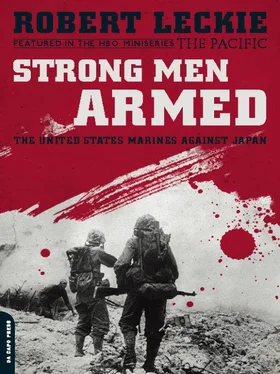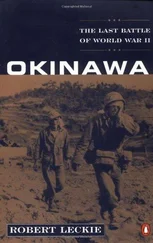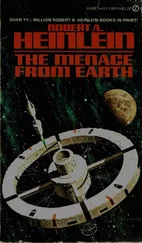Robert Leckie - Strong Men Armed
Здесь есть возможность читать онлайн «Robert Leckie - Strong Men Armed» весь текст электронной книги совершенно бесплатно (целиком полную версию без сокращений). В некоторых случаях можно слушать аудио, скачать через торрент в формате fb2 и присутствует краткое содержание. Город: Cambridge, Год выпуска: 2010, ISBN: 2010, Издательство: Da Capo Press, Жанр: nonf_military, на английском языке. Описание произведения, (предисловие) а так же отзывы посетителей доступны на портале библиотеки ЛибКат.
- Название:Strong Men Armed
- Автор:
- Издательство:Da Capo Press
- Жанр:
- Год:2010
- Город:Cambridge
- ISBN:978-0-786-74832-7
- Рейтинг книги:3 / 5. Голосов: 1
-
Избранное:Добавить в избранное
- Отзывы:
-
Ваша оценка:
- 60
- 1
- 2
- 3
- 4
- 5
Strong Men Armed: краткое содержание, описание и аннотация
Предлагаем к чтению аннотацию, описание, краткое содержание или предисловие (зависит от того, что написал сам автор книги «Strong Men Armed»). Если вы не нашли необходимую информацию о книге — напишите в комментариях, мы постараемся отыскать её.
Strong Men Armed — читать онлайн бесплатно полную книгу (весь текст) целиком
Ниже представлен текст книги, разбитый по страницам. Система сохранения места последней прочитанной страницы, позволяет с удобством читать онлайн бесплатно книгу «Strong Men Armed», без необходимости каждый раз заново искать на чём Вы остановились. Поставьте закладку, и сможете в любой момент перейти на страницу, на которой закончили чтение.
Интервал:
Закладка:
Far up north the coastwatcher Read crouched by his radio while an excited voice broadcast the results of his alert: “Boy, they’re shooting them down like flies… one… two… three… I can see eight of them in the water right now.”
But one of them fell in flames into an open hold of the transport George F. Elliott. The big ship was set hopelessly afire. She was scuttled at twilight, the first major American ship to rest beneath that body of water which would be known as Iron Bottom Bay for the scores of vessels which would join her on its floor. Fortunately, Elliott’s troops had gone ashore the preceding day—but she went down with a battalion’s supplies.
Night began to fall and General Vandegrift went aboard McCawley with a feeling of satisfaction. Though one transport was gone, though one destroyer was apparently only out of action, the Japanese had lost more than three-quarters of their planes, and they had not harmed those piles of precious supplies that were at last beginning to disappear inland. All of Vandegrift’s Marines were safely ashore, the airfield was his, the harbor islands were almost secured, and he could count on a few more days of unloading.
But he could not.
Admiral Turner was going to take the supply ships away in the morning.
The powerful Japanese surface force which he and Admiral Fletcher had feared was coming down The Slot.
5
The Slot was the sea corridor running 400 miles from Bougainville to Guadalcanal. It was a watery passage between the Solomon Islands, which faced each other in two near-orderly rows at near-regular intervals of from 50 to 60 miles. Japanese ships based at Rabaul had about 240 miles to go before they reached The Slot’s northwest terminus at Bougainville. They entered it at midday, planning to arrive off the southeast terminus at Guadalcanal under cover of darkness.
A task force of seven cruisers led by Rear Admiral Gunichi Mikawa entered The Slot at about midday on August 8. They came down it in column of battle: Mikawa’s flagship Chokai leading, followed by the heavy cruisers Aoba and Furutaka, next two more heavies, and then a pair of light cruisers. They were sighted almost immediately by an American search plane. But by half-past eleven on the night of August 8, the search plane’s warning had not been received by all of the ships patroling Savo Island.
With their picket destroyers, cruisers Chicago and Canberra guarded the south gate between Savo and Guadalcanal, while the north gate was held by Quincy, Vincennes and Astoria and their pickets. It was getting on to the midnight change of watches aboard these ships. Weary sailors tumbled out of their bunks, gulped hot coffee and groped their way on deck to relieve the eight-to-twelvers. The new watch could see faint flashes of lightning over the western horizon. A rain squall was making up off Savo. It would work for Admiral Mikawa.
His patrol planes had already been catapulted aloft, prepared to drop illuminating flares. His men were at their battle stations in gun turrets above decks, alongside torpedo tubes below—ready to strike the Allied warships before falling upon the thin-skinned transports at their leisure.
At about eleven o’clock some of the Allied warships began picking up unknown airplanes on their radar. Others actually heard them droning overhead. Some mistook them for friendly aircraft, for the Japanese pilots had boldly turned on running lights. In that confusion which often precedes disaster, the reports were either misdirected, misinterpreted or ignored.
A few minutes before one o’clock in the morning of August 9, Mikawa’s lookouts spotted the American destroyer Blue off to their right. Some 50 great guns swiveled around in the night and trained upon the little ship. Luckily for Blue, unhappily for her sister ships off Savo, neither her lookouts nor her radar had spotted the Japanese.
On went Mikawa’s cruisers, hitting 24 knots… 26…
At half-past one, Mikawa’s lookouts sighted Savo. Three minutes more and Mikawa passed the battle order:
“All ships attack!”
In five minutes, they had gotten the range, had loaded the torpedo tubes. In one more, hissing fish were leaping from the sides of the Japanese cruisers, were cleaving the dark water toward those unsuspecting sentinel ships. Two more minutes, and Chokai had closed to within two miles of them, still undetected…
Now the warning came. Destroyer Patterson had sighted a big ship. The radio alarm was braying:
“Warning! Warning! Strange ships entering harbor!”
It was forty-three minutes past one in the morning of August 9, and it was already too late.
Eerie greenish flares swayed down from the Japanese patrol planes and the harbor rocked to the roaring of the main batteries on Chokai, Aoba and Furutaka. Marines ashore looked fearfully at one another in baleful light filtering down from the blackness above. A dread silence interrupted the Tulagi conference of Vandegrift and Brigadier General William Rupertus. And then two of the Japanese steel fish finished their run by thrusting with cyclonic force into the side of Canberra, almost at the same moment that a shower of Japanese shells fell on her decks with merciless precision—and the Battle of Savo Island had begun.
The Japanese torpedoes had already given Canberra her mortal wounds, and though she fought back with two fish of her own and a few rounds from her four-inchers, she was done.
Chicago’s bow was blown off. She was out of the fight, unable to hinder the enemy cruisers swinging left and making for the northern force, running up on Quincy, Vincennes and Astoria, switching on their powerful searchlights, taking the stunned Americans under point-blank range and sending them to the bottom. Not all of them sank immediately, but they had taken their death blows.
The Battle of Savo Island, which sailors and Marines more accurately called the Battle of the Five Sitting Ducks, wore on until dawn—when Mikawa took his cruisers out of Iron Bottom Bay and streaked for home. He left the American transports unmolested, but he had sunk four cruisers, damaged a fifth and also damaged a destroyer. His only losses were a direct hit on Chokai’s chartroom, plus some slight damage to Aoba.
After Mikawa left, Admiral Turner also departed with the transports and their escorts.
In the sundown of August 9, men of the First Marines returning to the beaches from their toilsome, useless march inland, saw no ships in Iron Bottom Bay. Only a few blackened, smoking hulls were visible to their left, toward Savo as they faced the water. Otherwise there was nothing.
The Marines were all alone.
6
The fact of complete isolation had been accepted by Major General Vandegrift as early as the dawn of August 9. In that misty light, in a driving rain, he had assembled his staff officers, his regimental and battalion commanders.
The booming of the big guns could still be heard to the west of the Division Command Post near Alligator Creek. Concussions shook the palm fronds, showering those officers who stood beneath them to avoid the rain. Someone had made coffee over a smoking, sputtering fire. The hot black liquid was passed around in empty C-ration cans.
Offshore, lifting mists revealed the gray truncated shape of a prowless cruiser making slowly eastward between a pair of shepherding destroyers.
“Chicago,” someone said in awe.
There was a shocked silence, and then Colonel Gerald Thomas, the Division’s operations officer, broke the bad news swiftly.
The Navy was going, and no one could say when or if it would return. The Marines could presume loss of the air as well as the sea. They were not only isolated but separated, with nearly half of the combat battalions over on the harbor islands. That very loss of air and sea suggested that there would be no hope of getting these troops over to Guadalcanal. Tulagi had eight days’ supplies and Guadalcanal a few days more than that. Reinforcements, resupply, were only a hope. What were they going to do?
Читать дальшеИнтервал:
Закладка:
Похожие книги на «Strong Men Armed»
Представляем Вашему вниманию похожие книги на «Strong Men Armed» списком для выбора. Мы отобрали схожую по названию и смыслу литературу в надежде предоставить читателям больше вариантов отыскать новые, интересные, ещё непрочитанные произведения.
Обсуждение, отзывы о книге «Strong Men Armed» и просто собственные мнения читателей. Оставьте ваши комментарии, напишите, что Вы думаете о произведении, его смысле или главных героях. Укажите что конкретно понравилось, а что нет, и почему Вы так считаете.












